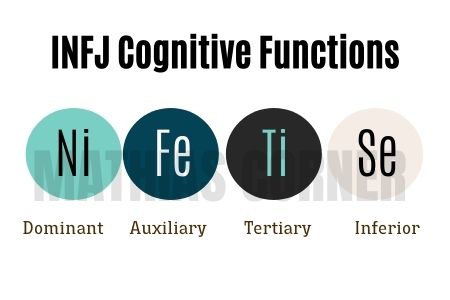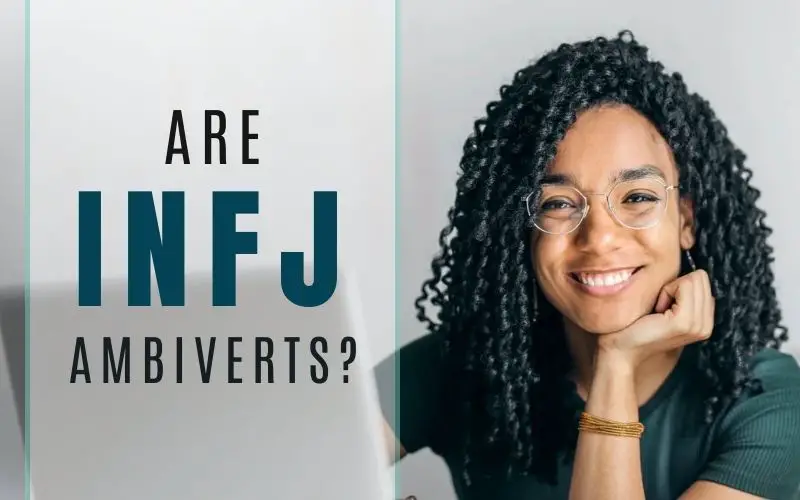If you have an INFJ in your life, then you’ll notice how they tread across the reserved personality and an extroverted one.
They’re deep thinkers, yet quirky at the same time. Focused, but can be funny goofballs, too. Because of such duality, people would wonder about their true personalities. Now, people ask, “Is INFJ personality an introvert or extrovert?” Or are they ambiverts?
INFJs are indeed true introverts. Although they have innate social skills which make people think they’re ambiverts, truth is, INFJs are predominantly introspective and self-reflective. They are less outgoing than most people think they are.
The Secret Hermits
I was surprised when I first learned several of my friends were INFJs. All this time, I didn’t know I was surrounded by 4 INFJs and they were all my closest friends!
Who would’ve thought that these loud, fun, and crazy goofballs were introverts, let alone INFJs? The idea never crossed my mind.
They blend with people well. They’re a confident bunch, fashionistas, and would visit your home for an indefinite number of hours to tell stories (or would accommodate you in their homes instead).
I wouldn’t suspect how introverted my INFJ friends were. Not until I asked them to take a personality test. However, as I dig deep into learning their ways, their INFJ signs and traits become more evident.
Many INFJs are secret hermits after all. They can be outgoing, but they’re in no doubt introverts through and through.
You may also like: INFJ VS. INFP Differences: Which One Are You?
Why are INFJs mistaken for extroverts?
INFJ stands for Introverted-iNtuitive-Feeling-Judging. These dichotomies alone show how INFJs lean on the introvert spectrum. But why are INFJs mistaken for extroverts?
The top reasons might be that they don’t look like the typical introvert stereotype. Truly, many INFJs I know are not shy, quiet, or aloof.

1. INFJs appear to be extroverts because they aren’t the usual “shy introvert” stereotype.
Shyness and quietness are not synonymous. Due to INFJ’s reserved nature, there are situations where they rarely engage with people, well, unless you talk to them first.
But their silence doesn’t mean they’re scared to talk. Rather, they’re calculative of the situation or too focused on a task at hand. But once you talk with them, you will be caught in an overflow of warmth and empathy.
2. INFJs are confident and great communicators.
I noticed how INFJs appear as background-type people, yet carry distinct energy that influences a group’s overall mood. Their laughs, attentiveness, and engaging questions set a heartwarming atmosphere.
They can communicate at other people’s levels and meet you where you’re at. It always amazes me how INFJs capture my thoughts even when I haven’t explained myself enough.
3. Unlike the introvert stereotype, INFJs are not aloof.
Before INFJs open their mouths, I’m pretty sure the words “intimidating” and “intense” will cross your mind. They have what some people call the “resting B* face”.
But these intimidating looks were due to INFJ’s relentless calculating nature. Due to their dominant function, Introverted Intuition (Ni), they’re drawn to search, think, and make sense of what’s around them.
But once you approach them, their warmth and outgoing personality start to ooze and wash away any wrong impressions.
Also read: How to Spot INFJ: 8 Tell-tale Signs You’re Talking with One
Are INFJs ambiverts?
In this section, let’s point out two things – ambiversion and INFJs being true introverts.

What is ambiversion?
The term “ambivert” is used to describe someone who is adaptive to introverted and extroverted traits. If you’re an introvert who loves to enjoy an overnight party with friends, or an extrovert who also fancy alone time with Netflix, then you may be regarded as an ambivert.
Well, at least it’s what most people say.
However, I’d take the courage to disagree about the idea of ambiversion. I believe social energy can only be categorized into two traits: introverted or extroverted.
It’s either you lean on the more introverted or more on the extroverted attitude. Moreover, if you’ll look closely at how people describe “ambiverts”, you will find vague signs and characteristics.
I’ve read signs from a few articles telling that, you’re an ambivert if you’re “a great listener and a communicator”. Wow, that’s helpful, but don’t most people do that? Or you’re an ambivert if “you work well in solo and in groups”.
But come to think of it. Introvert leaders can communicate well and inspire teams. Empathetic extroverts can listen and be creative when alone, too. As I see it, these descriptions are unclear and every single person can fall into the category of ambiversion.
In conclusion, I currently don’t follow the idea of ambiversion. For me, it is whether you lean on the introvert or extrovert spectrum. (But I’m open to new research.)
Going back to the question, are INFJ ambiverts?
I’d say INFJs are indeed true introverts. Although they have innate social skills, INFJs are predominantly introspective and self-reflective. They are less outgoing than most people think they are.
They are reserved, prefer to work independently, and regain their energy more in alone time, rather than swamping themselves in an overflow of social ventures.
And when we say “true introverts,” it’s not someone who’s 100% introverted. According to Carl Jung, the founder of analytic psychology, no one is 100% introverted or extroverted. Rather, a “true introvert” is someone who leans to introverted functions predominantly.
Truth is, we interact in this world using both introverted and extroverted traits.
Just look at the cognitive functions stacks (look at an image below). Because an INFJ has introverted Intuition (Ni) as a dominant function, they automatically have extraverted Sensing (Se) as inferior. Because they have extraverted Feeling (Fe) as an auxiliary function, their tertiary becomes introverted Thinking (Ti).
People always use both introverted and extroverted traits. Only that, we have a paramount preference on which to use more often.
But why do INFJs appear extroverted?
This time, let’s look to an INFJ’s cognitive ego stack:

- Dominant: Introverted iNtuition (Ni)
- Auxiliary: Extraverted Feeling (Fe)
- Tertiary: Introverted Thinking (Ti)
- Inferior: Extraverted Sensing (Se)
With INFJ’s introverted intuition (Ni-dominant) as a default, they become calculating and deep thinkers in nature.
They see the world through collecting the observable information, patterns, and concepts that lead them into a sensible, narrowing, and conclusive path about their surroundings.
But what makes INFJs appear extroverts is their extraverted Feeling (Fe) as the auxiliary function which translates to their desire for social harmony.
In the presence of people, INFJs lead with tribe mentality, prioritize other people’s welfare and enjoyment, and mirror people’s energy.
However, when alone and thinking, INFJs always retort to their introverted intuition (Ni) function. They prefer alone time as it gives way to their innate profound analysis of life.
Being true introverts, INFJs are less available than you think they are.
INFJs have an interesting duality. Let’s picture INFJs for a bit.
These idealists are reserved, yet have remarkable people skills. Truly attentive listeners. Their calming and gravitating presence along with timely giggles or boisterous laughs creates a homey atmosphere.
When you give them the floor, an INFJ will undoubtedly grab the chance to express their viewpoint, estimation, or the whole expanse of what they’re interested in. They love diplomatic and informative discussions.
However, one day, you will discover that although they looked particularly euphoric in get-togethers, these “outgoing” INFJs are actually less available than you think they are.
They may have laughed hard with you today, but watch out for the next few gatherings. As introverts, INFJs will be drawn to decline any excessive social interactions. When they’re introverting, they would either make up reasons or use valid excuses to politely turn down invitations.
Wrap up
As an INFP, I also see my INFJ friends as social butterflies and great conversationalists. With them, you will always leave a conversation happy, entertained, and satisfied.
However, if we look into INFJs, they are real-deal deep thinkers who strive to make profound conclusions and pursue a deep-rooted vision.
Their ability to be reserved and still socialize is truly an amazing feat. But if possible, they would opt to have their alone time and soak themselves in their own rest and creativity.
Thus, this makes INFJs true introverts.
That’s it. I hope this article gave you insights. Thanks for reading!
-M.Mathias
Was this helpful? If it is, you can buy me a coffee to support my work. Thanks! 🙂
You may also like:
- 5 Things That Turn Off and Annoy INFJ
- INFJ Rage: 4 Ways INFJ Shows Anger
- The INFJ Mind: Good and Bad Traits of INFJ Personality

